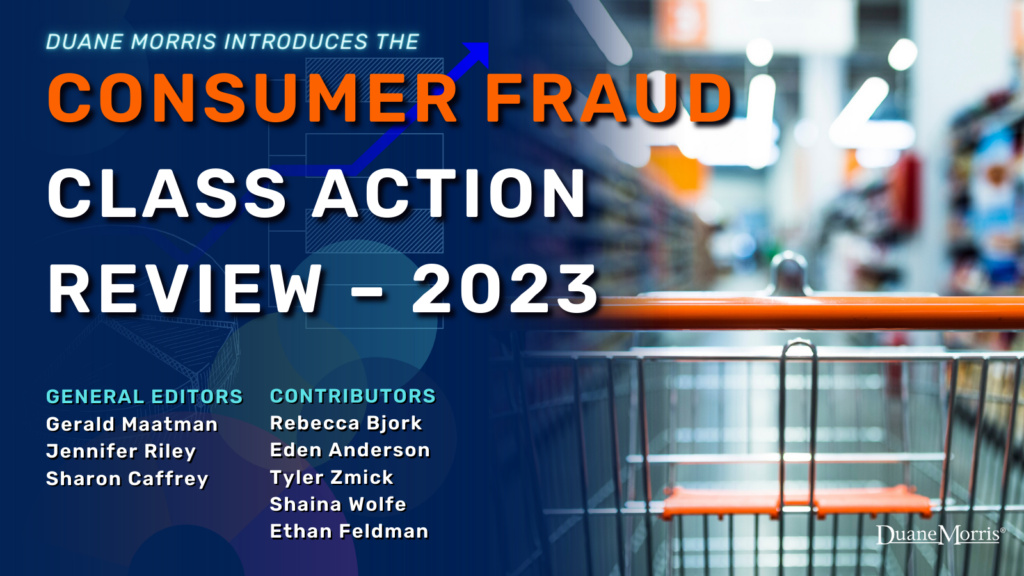 By Gerald L. Maatman, Jr., Jennifer A. Riley, and Shaina Wolfe
By Gerald L. Maatman, Jr., Jennifer A. Riley, and Shaina Wolfe
Duane Morris Takeaways: On July 6, 2023, in Restaurant Law Center, et al. v. U.S. Department of Labor, No. 1:21-CV-1106 (W.D. Tex. July 5, 2023) (ECF No. 67), federal district judge Robert Pitman of the U.S. District Court for the Western District of Texas denied the Restaurant Groups’ motion for preliminary injunction as to the new “80/20 Rule” – after being reversed by the Fifth Circuit several months prior – and denied the Restaurant Groups’ motion for summary judgment and granted the Department of Labor’s (“DOL”) motion for summary judgment. Judge Pitman determined that the DOL’s decision to construct and enforce the Final Rule was a permissible construction of the Fair Labor Standards Act (“FLSA”) and is not arbitrary and capricious. ECF 67 at 28. The ruling is nowhere close to the end of this litigation and the service and hospitality industry should pay close attention to what comes next as the Restaurant Law Center will inevitably appeal the district court’s decisions to the Fifth Circuit and as the U.S. Supreme Court has decided to reconsider the authority of agencies during the next term. The next set of decisions will be part of a broader analysis of the rules regarding tip credit, and more generally, the DOL’s authority.
The Final Rule
In late 2021, the DOL revived and revised the 80/20 Rule by providing that employers can utilize the tip credit only so long as 80 percent or more of the work is tip-producing, and not more than 20 percent is “directly supporting work.” See 29 C.F.R. § 531.56. Under the Final Rule, no tip credit can be taken for any non-tipped work. “Tip-producing work” is defined as work the employee performs directly providing services to customers for which the employee receives tips (i.e., taking orders and serving food). “Directly supporting work” is defined as work that is performed by a tipped employee in preparation of or to otherwise assist tip-producing customer service work (i.e., rolling silverware and setting tables). Non-tipped work includes preparing food or cleaning the kitchen, dining room, or bathrooms.
The Final Rule also includes a new requirement that an employer cannot utilize the tip credit when an employee performs more than 30 consecutive minutes of “directly supporting work.” Directly supporting work done in intervals of less than 30 minutes scattered throughout the workday would not invalidate the tip credit, subject to the 80/20 Rule. However, employers must pay minimum wages for “directly supporting work” performed after the lapse of the first 30 continuous minutes.
Procedural Background
In December 2021, the Restaurant Law Center challenged the Final Rule in the U.S. District Court in the Western District of Texas, on the grounds that, among other things, it violated the Fair Labor Standards Act. Restaurant Law Center, No. 1:21-CV-1106 at 4. The Texas federal district court denied the preliminary injunction after finding that the Plaintiffs failed to show that they would suffer irreparable harm absent the preliminary injunction. Id.
On April 28, 2023, the Fifth Circuit reversed the Texas federal district court, finding that the Restaurant Groups “sufficiently showed irreparable harm in unrecoverable compliance costs . . . .” Rest. L. Ctr. v. U.S. DOL, 66 F.4th 593, 595 (5th Cir. 2023). Significantly, the Fifth Circuit noted that that compliance costs would likely be necessary to track the number of minutes worked on nontipped labor and that the new 30-minute rule would impose additional monitoring costs. Id. The Fifth Circuit remanded the case for further proceedings. Id. [Our previous blog post on that ruling is here.]
The Texas Federal District Court’s Decision on Summary Judgment
At the second go-around, the district court had two fully-briefed motions, including: (1) the Restaurant Groups’ motion for preliminary injunction; and (2) the parties’ cross-motions for summary judgment. The district court denied the Restaurant Groups’ motion for summary judgment and granted the DOL’s cross-motion for summary judgment after finding that, contrary to the Restaurant Groups’ assertions, the DOL’s decision to construct and implement the Final Rule was a permissible construction of the FLSA and is not arbitrary and capricious. Id. at 28. In addition, the Texas federal district court denied the Restaurant Groups’ motion for preliminary injunction after finding that the Restaurant Groups did not succeed, and were likely not to succeed, on the merits of the case, that the balance of equities did not tip in the Restaurant Groups’ favor, and that an injunction was not in the public interest. Id.
In determining the Final Rule’s validity, the district court used a two-step framework articulated in Chevron, USA, Inc. v. Natural Resources Def. Council, Inc., 467 U.S. 837 (1984). Id. at 8. Under Chevron, if a statute has a gap that needs to be filled, Congress gave the agency administering the rule, rather than courts, authority to resolve it. Id. The district court found that Chevron deference applied to the case because Congress “delegated authority to the agency generally to make rules carrying the force of law,” and that the Final Rule “was promulgated in the exercise of that authority.” Id. at 10.
The federal district court also analyzed the FLSA’s text, structure and purpose, and legislative history, and found that, contrary to the Restaurant Group’s assertions, the statute was ambiguous. Id. at 17. The district court explained that “Congress has crafted an ambiguous statute and tasked DOL with implementing the ambiguous provisions,” and the Court “must defer to the agency’s regulation so long as it is not arbitrary, capricious, or manifestly contrary to the statute.” Id. at 17. The district judge further found that the Final Rule “accomplishes” the purposes of the FLSA “by adopting a ‘functional test’ to determine when an employee may be considered engaged in a tipped occupation.” Id. at 19.
Significantly, the district court also considered whether the Major Questions Doctrine was triggered, as discussed in West Virginia v. EPA, 142 S. Ct. 2587 (2022). Id. at 24. The district court found that the Major Questions Doctrine was not triggered because an agency action was only considered to be of “vast economic significance” if it requires “billions of dollars in spending.’” Id. at 25. The district court found that the DOL “pointed out that the average annual cost of the Rule in this case is $183.6 million” and explained that this amount was “far less than the billions considered in the cited cases. Id. The district court further opined that the “DOL has been interpreting the tip credit provision of the FLSA, as well as its other provisions, for decades.” Id.
The Texas Federal District Court’s Decision on the Preliminary Injunction
In addition, as instructed by the Fifth Circuit, the district court reconsidered the Restaurant Groups’ Motion for Preliminary Injunction. At the outset, the district court noted that “[a]lthough a failure to show likelihood of success on the merits is grounds alone for denial of a preliminary injunction, the Court will address the two remaining Rule 65 factors pursuant to the Fifth Circuit’s mandate to ‘proceed expeditiously to consider the remaining prongs of the preliminary injunction analysis.’” Id. at 26 (citing Rest. L. Ctr., 66 F.4th at 600). Despite the Fifth Circuit’s finding that Restaurant Groups will suffer irreparable harm because their compliance costs are non-recoverable, Rest. L. Ctr, 66 F.4th at 595, in balancing the equities, the district court essentially found the opposite – – that the Restaurant Groups, again, failed to show irreparable harm from complying with the Final Rule. See id. at 26-27.
Significantly, the Fifth Circuit previously disagreed with the DOL’s assertion that “employers need not engage in ‘minute to minute’ tracking of an employee’s time in order to ensure that they qualify for the tip credit.” Rest. Law Ctr., 66 F.4th at 599 (“No explanation is given (nor can we imagine one) why an employer would not have to track employee minutes to comply with a rule premised on the exact number of consecutive minutes an employee works.”). Contrary to the Fifth Circuit, the district court agreed with the DOL and found that “restaurants must already monitor the amount of time employees spend on non-tipped labor under the 80/20 rule, and the new 30-minute rule does not impose a new form of monitoring.” ECF 67 at 26. In addition, the district court noted that it is not clear that the Rule imposes significantly greater costs than restaurants incurred under the preexisting guidance because the Restaurant Groups failed to “provide an estimate of this additional monitoring.” Id. In essence, contrary to the Fifth Circuit’s Order, the district court, again, “emphasized the weakness of [the Restaurant Groups’] evidence.” Rest. Law Ctr., 66 F.4th at 598 (“For instance, the court found [the Restaurant Groups] claimed ongoing costs “to be overstate[d]” because the rule does not require “the level of detailed monitoring of which [the Restaurant Groups] warn. . . [this point is] meritless”).
Further, the district court explained that eighteen months had passed since the parties filed their briefs on the preliminary injunction, and that the Rule took effect on December 28, 2021 and has remained in place. Id. Without citing to any evidentiary support, the district court noted that “[r]estaurants and DOL have complied with the Rule since that time.” Id. at 27.
Moreover, similar to the district’s court’s first order, which was reversed by the Fifth Circuit, the district court explained “that even if there are ongoing management costs, the most significant compliance costs associated with the Rule were familiarization and adjustment costs, which have now already been incurred, and that granting an emergency motion to rescind the Rule now cannot undo these costs, and may very well force restaurants to incur additional costs adjusting to the policy that takes its place.” Id. Ultimately, the district court found that the Restaurant Groups’ “compliance costs do not outweigh the substantial harm that DOL may endure from essentially starting from scratch on a rule that serves to codify long-standing guidance.” Id.
Thus, the district court found that even if Restaurant Groups showed a likelihood of success on the merits, “neither the balance of equities nor the public interest would support a nationwide preliminary injunction.” Id. at 28.
Implications For The Service & Hospitality Industry
The fight to end and/or limit the Department of Labor’s authority and promulgation of the tip credit rule is far from over. Although the Texas federal district court sent a clear indication that it did not agree with the Fifth Circuit’s decision, and that it would not disturb the Department of Labor’s authority, the service and hospitality industry should be watchful for what has yet to come. The Restaurant Law Center will undoubtedly appeal both of the Texas federal district court’s rulings, and the Fifth Circuit has already indicated that preventing enforcement of the Final Rule may be on the horizon. Moreover, the Supreme Court’s decision to reconsider the Chevron doctrine in Loper Bright Enterprises v. Gina Raimondo, Case No. 22-451 – which will be heard in the next term – to the extent that it narrows or eliminates federal courts’ deference to agencies’ decisions, could substantially impact the agenda the Department of Labor can pursue. The service and hospitality industry should stay tuned for the Fifth Circuit’s rulings in Restaurant Law Center and Supreme Court’s forthcoming ruling Loper Bright Enterprises.
 By Brandon Spurlock and Jennifer A. Riley
By Brandon Spurlock and Jennifer A. Riley








